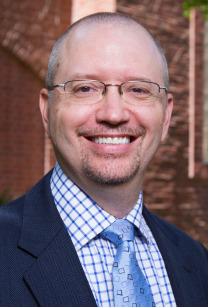
Education has not kept up with the access children have to digital media. An Iowa State University professor is working to change that. (Larger image) Photo by Christopher Gannon
AMES, Iowa – Access to digital technology has far outpaced the availability of educational resources to promote responsible use. Douglas Gentile, a professor of psychology at Iowa State University, fears what the consequences might be if that trend is not reversed.
“There has never been a period in human history when we have created such a powerful tool and then placed it in the hands of toddlers and children without proper training or supervision,” he said.
That is why Gentile is working with the Partnership for a Drug-Free Iowa to expand digital literacy programming in schools. Iowa Gov. Kim Reynolds announced one part of that effort, a first of its kind digital literacy conference, which will bring experts from around the world to Ames to discuss the effects of media on health, education, workplace productivity, body image, aggression and wellness.
“This conference is an opportunity for Iowa to lead the way with cutting edge research and teaching tools to strengthen our children and teens by making them more media savvy,” Gov. Reynolds said. “The goal of digital literacy is to improve the behavioral health and educational outcomes of Iowa’s youth. That means minimizing the risks and maximizing the benefits of growing up in a fast-changing digital world.”
Gentile, an expert on media effects, wants to see Iowa as a leader in digital literacy education. Children not only need to be responsible digital media users, but also be aware of its influence, he said. Gentile’s research has identified positive and negative effects of television, movies and video games on behavior, obesity and educational outcomes. Among those negative effects, the risk for addiction increases with access. Gentile says the explosion of mobile devices has amplified the amount of time we spend in front of a screen and the potential for harm.
“Knowingly or not, we have been engaging in a grand experiment where we give almost 24-hour access to this powerful technology without really knowing what the effects of it might be, simply trusting that technology will somehow provide unlimited benefits,” Gentile said. “Although that is theoretically possible, the early science demonstrates both problems and benefits.”
Iowa State is one of several supporters of the "Digital Literacy Conference: The Media, Critical Thinking & Wellness" on Friday, November 10, at the Gateway Hotel & Conference Center in Ames. Featured speakers and topics include Gentile, who will explain the science on media influence; David Walsh, a psychologist, on why media literacy matters; Tyler Oesterle, a doctor at Mayo Clinic, on the link between media and substance use; and Yuhyun Park, a UNESCO award winner for her digital literacy program, among others.
Find more information and conference registration here: https://trainingresources.org/Events.aspx.
